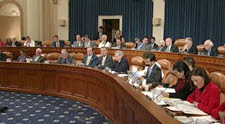As landmark tax reform enacted last December begins to reverberate through the economy, economists, Congress and industry experts are starting to assess its impact on economic investment and commercial real estate.
 |
The House Ways and Means Committee plans to hold a series of hearings on the Tax Cuts and Jobs Act (TCJA) impact on job creation and the economy starting May 16. |
- The House Ways and Means Committee plans to hold a series of hearings on the Tax Cuts and Jobs Act (TCJA) impact on job creation and the economy starting May 16.
- Ways and Means Chairman Brady: "It is exciting to see tax reform boosting our economy and giving families and workers across the country the relief they deserve. Wages are growing at their fastest pace in 10 years, unemployment claims are at their lowest since the 1960s, and Main Street businesses are expanding like never before." (Ways and Means Advisory, May 9)
TCJA & Economic Investment:
New data shows tax reform is resulting in more capital investment and expenditures.
- US Groups Plough Tax Cash into Capex Ahead of Investors, Financial Times (May 1) – "The median S&P 500 company expanded its investment spending by a more modest 13 per cent year on year, according to Bank of America. … Analysts have been surprised to see the growth in capital spending among S&P 500 companies outstrip the increases in buybacks and dividends."
- Cycle Watch: U.S. Economic Expansion Reaches Historic Point, Cushman & Wakefield (May 1) – On July 1, 2019, the current (economic) expansion may become the longest in U.S. history. "Current estimates of the probability of a recession within the next 12 months are between 0-25%. A majority of forecasters have predictions between 10-15%. Tailwinds from fiscal stimulus and the revival of emerging markets as a global growth engine bode well for the economy in the near-term."
TCJA's Positive Impact on Commercial Real Estate:
- The Impact of Tax Reform by Peter Linneman, Commercial Property Executive (May 2) – "… Tax reform legislation is neutral to positive for commercial real estate and very positive for the economy in general. Because the changes to commercial real estate are not dramatic, most investors should feel fairly confident."
- Marcus & Millichap CEO Hessam Nadji interview , Fox Business (May 1) – "The tax reform was very favorable, not just for corporations but also for commercial real estate investing. For over 50 years, the American Dream has been centered around real estate ownership, which was home ownership. That's shifting towards renting and investing in commercial real estate in the form of small apartments or small office buildings or shopping centers - and the tax reform really made that a lot more favorable.
 |
The Impact of Tax Reform by Peter Linneman, Commercial Property Executive (May 2) – "… Tax reform legislation is neutral to positive for commercial real estate and very positive for the economy in general. Because the changes to commercial real estate are not dramatic, most investors should feel fairly confident." |
- Investors Find Confidence Thanks to U.S. Tax Reform, Hotel Management (April 30) – "According to the firm's NREI/Marcus & Millichap Investor Sentiment Survey from the first half of the year, the Investor Sentiment Index grew to 163. …[D]ue to tax-law changes, 68 percent of survey respondents said that they expect the economy to grow faster. Meanwhile, 71 percent said that tax reform will have a favorable impact on commercial real estate."
- U.S. Apartment Investment Market to Enjoy Boost From New Tax Plan, World Property Journal (May 11) – "According to a new report by CBRE that analyzed the implications of tax reform on the multifamily sector in the largest 35 U.S. property markets, the recently enacted U.S. tax reform is poised to benefit the U.S. multifamily investment market."
- Commercial Real Estate: A Clear Winner From Tax Reform, Clarion Partners (March 2018) – "Tax reform will likely raise consumer spending, employment levels, business investment, and wage growth ... interest rates will likely stay low over the long‐term due to the deflationary pressures associated with the global savings glut, ongoing technological innovation, and weakening demographic trends."
Along with TCJA rulemaking and implementation, the legislation's impact on CRE will be a focus of discussion at The Roundtable's Annual Business Meeting and Policy Advisory Committee Meetings on June 14-15 in Washington, DC


